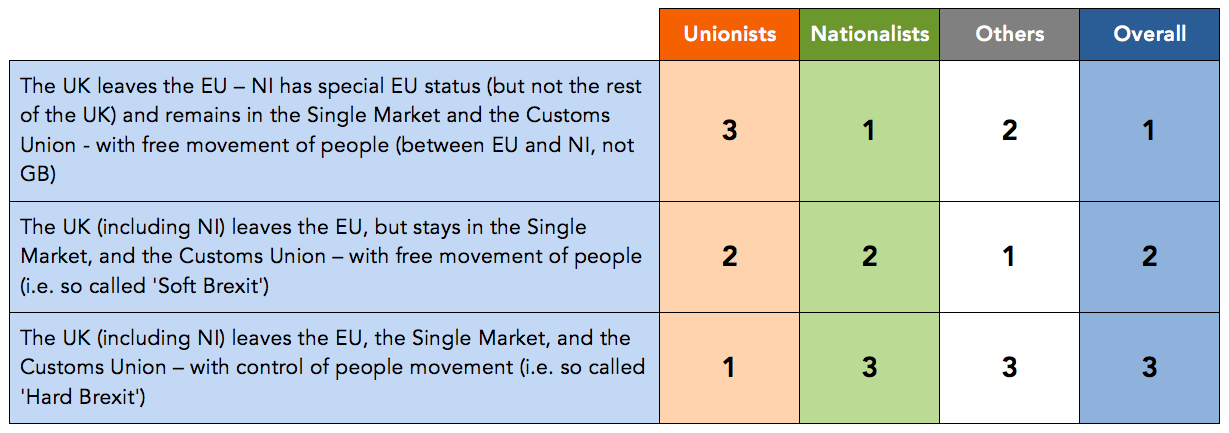It’s been a year since the UK voted to leave the European Union, but the dust has far from settled. If ‘Brexit means Brexit’ meant anything at all, it almost certainly means even less in the wake of this month’s general election upset.
Back in December, the Prime Minister told us we’re heading for a ‘red, white and blue’ Brexit. It beats other contenders – ‘bespoke Brexit’, ‘sensible’ Brexit, and plenty of others – for its sheer vagueness. But until negotiations progress further, it’s much easier to throw around catchphrases than to specify practical details.
In Northern Ireland, we have a much clearer sense of our destination than you might have thought: we may well end up with our very own ‘green, white and orange’ Brexit.
The debate around EU membership initially had the potential to cut across Northern Ireland’s traditional unionist-nationalist divide. As in elections, however, voting behaviour in last June’s referendum followed a clear ethno-national pattern.
A report by Professor John Garry from Queen’s University Belfast found that nationalists voted overwhelmingly to remain in the EU, by a margin of 88% to 12%. Unionists tended to vote decisively in the opposite direction: two-thirds voted to leave, while just a third voted to remain.
In the wake of the referendum, nationalists and unionists remain heavily divided on the precise path Brexit should take.
The latest poll from LucidTalk asked respondents to consider three potential options for Brexit, and to rank them in order of preference. We can observe a striking asymmetrical pattern.

“The UK and the EU have started negotiations on Brexit. Please rank the following 3 possible outcomes for Northern Ireland (NI) from best to worst, in terms of which outcome you think is the best result for NI.” 2,080 responses (weighted); displaying the ordered preferences of unionist, nationalist and other respondents based on the sum of weighted ranks for each group.
Unionist voters rank a ‘hard’ Brexit as their most preferred outcome. Support for a ‘soft’ Brexit isn’t too far behind, whereby the whole of the UK would leave the EU, but would remain in the Single Market and Customs Union.
The least preferred option for unionists – and decisively so – is for Northern Ireland to possess ‘special status’, whereby the rest of the UK could leave the Single Market and Customs Union, but Northern Ireland would still remain in each.
Among nationalist voters, the pattern is the reverse. The ‘special status’ option scores the highest ranking; ‘soft’ Brexit is the next preferred option. A ‘hard’ Brexit scores very low with this group.
Supporters of ‘other’ parties like Alliance and the Greens present yet another pattern. These voters tend to prefer a UK-wide ‘soft’ Brexit ahead of other options, slightly ahead of their support for ‘special status’ for Northern Ireland. Like nationalists, however, a ‘hard’ Brexit was by far the least preferred option amongst this group.
So what does this mean? In short, it suggests that for whatever uncertainty exists around the precise form of Brexit, it is very possible that Northern Ireland will be predictably divided on the outcome along traditional dividing lines. This could be a long-lasting challenge, risking further polarisation in the wake of a final deal between the UK and EU.
However, these numbers also show how a polarising ‘green, white and orange’ Brexit may be avoided. For both nationalists and unionists, their middle preference is the same: a ‘soft’ Brexit for the UK as a whole.
If nationalist and unionist leaders are interested in finding common ground over Brexit, they may do well to articulate a common purpose around this middle option. So far, this common purpose is lacking. This principally stems from the absence of a government in Northern Ireland to push any strategic goal on Brexit, but it also stems from the apparently diverging positions taken by each of the parties in recent months.
Sinn Féin and the SDLP – and Alliance – have been vocal in their calls for ‘special status’. The DUP, meanwhile, kingmakers at Westminster with a unique ability to influence the position of Theresa May’s government, has rebuffed those calls. On top of that, however, Ian Paisley Jr told the BBC that his party “will not countenance” a ‘soft’ Brexit for the UK as a whole.
We have a long way to go until negotiations with Brussels conclude. New possibilities may emerge, and attitudes may change.
Brexit could entrench Northern Ireland’s traditional divisions further. But political leaders also have an opportunity to work together and push for a compromise option that could at least mitigate those divisions. The choice is theirs.
Methodology, and more on LucidTalk
Polling was carried out by Belfast based polling and market research company LucidTalk. The project was carried out online for a period of 60 Hours from 11am 21st June to 11pm 23rd June 2017 (60 Hours). The project targeted the established Northern Ireland (NI) LucidTalk online Opinion Panel (8,827 members) which is balanced by gender, age-group, area of residence, and community background, in order to be demographically representative of Northern Ireland.
2,883 full responses were received, and a data auditing process was carried out to ensure all completed poll-surveys were genuine ‘one-person, one-vote’ responses, and also to collate a robust and accurate balanced NI representative sample. This resulted in 2,080 responses being considered in terms of the final results – the results presented in this report.
All data results have been weighted by gender and community background to reflect the demographic composition of Northern Ireland resulting in 2,080 responses being considered in terms of the final results. All data results produced are accurate to a margin of error of +/-3.0%, at 95% confidence.
LucidTalk is a member of all recognised professional Polling and Market Research organisations, including the UK Market Research Society (UK-MRS), the British Polling Council (BPC), and ESOMAR (European Society of Market Research organisations).
For more information, visit www.lucidtalk.co.uk and follow @LucidTalk on Twitter.
Also published on Medium.
